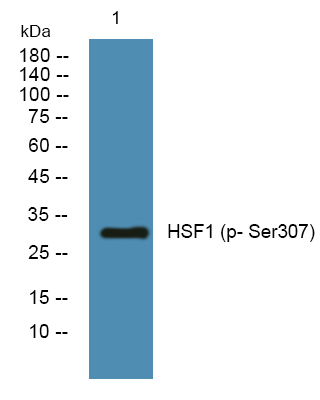HSF1 (phospho Ser307) Polyclonal Antibody
- Catalog No.:YP1188
- Applications:WB;IF;ELISA
- Reactivity:Human;Rat;Mouse;
- Target:
- HSF1
- Fields:
- >>Legionellosis
- Gene Name:
- HSF1
- Protein Name:
- Heat shock factor protein 1
- Human Gene Id:
- 3297
- Human Swiss Prot No:
- Q00613
- Mouse Swiss Prot No:
- P38532
- Immunogen:
- The antiserum was produced against synthesized peptide derived from human HSF1 around the phosphorylation site of Ser307. AA range:273-322
- Specificity:
- Phospho-HSF1 (S307) Polyclonal Antibody detects endogenous levels of HSF1 protein only when phosphorylated at S307.
- Formulation:
- Liquid in PBS containing 50% glycerol, 0.5% BSA and 0.02% sodium azide.
- Source:
- Polyclonal, Rabbit,IgG
- Dilution:
- WB 1:500 - 1:2000. IF 1:200 - 1:1000. ELISA: 1:5000. Not yet tested in other applications.
- Purification:
- The antibody was affinity-purified from rabbit antiserum by affinity-chromatography using epitope-specific immunogen.
- Concentration:
- 1 mg/ml
- Storage Stability:
- -15°C to -25°C/1 year(Do not lower than -25°C)
- Other Name:
- HSF1;HSTF1;Heat shock factor protein 1;HSF 1;Heat shock transcription factor 1;HSTF 1
- Observed Band(KD):
- 30kD
- Background:
- heat shock transcription factor 1(HSF1) Homo sapiens The product of this gene is a transcription factor that is rapidly induced after temperature stress and binds heat shock promoter elements (HSE). This protein plays a role in the regulation of lifespan. Expression of this gene is repressed by phsphorylation, which promotes binding by heat shock protein 90. [provided by RefSeq, Aug 2016],
- Function:
- function:DNA-binding protein that specifically binds heat shock promoter elements (HSE) and activates transcription. In higher eukaryotes, HSF is unable to bind to the HSE unless the cells are heat shocked.,PTM:Phosphorylated on multiple serine residues, a subset of which are involved in stress-related regulation of transcription activation. Constitutive phosphorylation represses transcriptional activity at normal temperatures. Levels increase on specific residues heat-shock and enhance HSF1 transactivation activity. Phosphorylation on Ser-307 derepresses activation on heat-stress and in combination with Ser-303 phosphorylation appears to be involved in recovery after heat-stress. Phosphorylated on Ser-230 by CAMK2, in vitro. Cadmium also enhances phosphorylation at this site. Phosphorylation on Ser-303 is a prerequisite for HSF1 sumoylation. Phosphorylation on Ser-121 inhibits transacti
- Subcellular Location:
- Nucleus . Cytoplasm . Nucleus, nucleoplasm . Cytoplasm, perinuclear region . Cytoplasm, cytoskeleton, spindle pole . Cytoplasm, cytoskeleton, microtubule organizing center, centrosome . Chromosome, centromere, kinetochore . The monomeric form is cytoplasmic in unstressed cells (PubMed:8455624, PubMed:26159920). Predominantly nuclear protein in both unstressed and heat shocked cells (PubMed:10413683, PubMed:10359787). Translocates in the nucleus upon heat shock (PubMed:8455624). Nucleocytoplasmic shuttling protein (PubMed:26159920). Colocalizes with IER5 in the nucleus (PubMed:27354066). Colocalizes with BAG3 to the nucleus upon heat stress (PubMed:8455624, PubMed:26159920). Localizes in subnuclear granules called nuclear stress bodies (nSBs) upon heat shock (PubMed:11447121, PubMed:1151455
- Expression:
- Adipose tissue,Brain,Epithelium,Muscle,
- June 19-2018
- WESTERN IMMUNOBLOTTING PROTOCOL
- June 19-2018
- IMMUNOHISTOCHEMISTRY-PARAFFIN PROTOCOL
- June 19-2018
- IMMUNOFLUORESCENCE PROTOCOL
- September 08-2020
- FLOW-CYTOMEYRT-PROTOCOL
- May 20-2022
- Cell-Based ELISA│解您多样本WB检测之困扰
- July 13-2018
- CELL-BASED-ELISA-PROTOCOL-FOR-ACETYL-PROTEIN
- July 13-2018
- CELL-BASED-ELISA-PROTOCOL-FOR-PHOSPHO-PROTEIN
- July 13-2018
- Antibody-FAQs
- Products Images

- Western blot analysis of lysates from A431 cells, primary antibody was diluted at 1:1000, 4°over night



